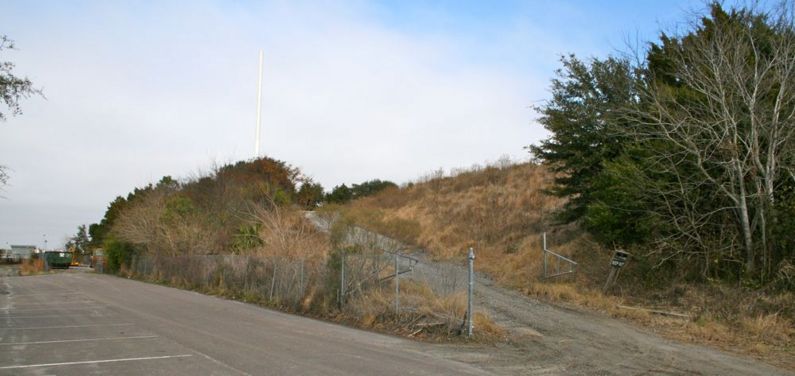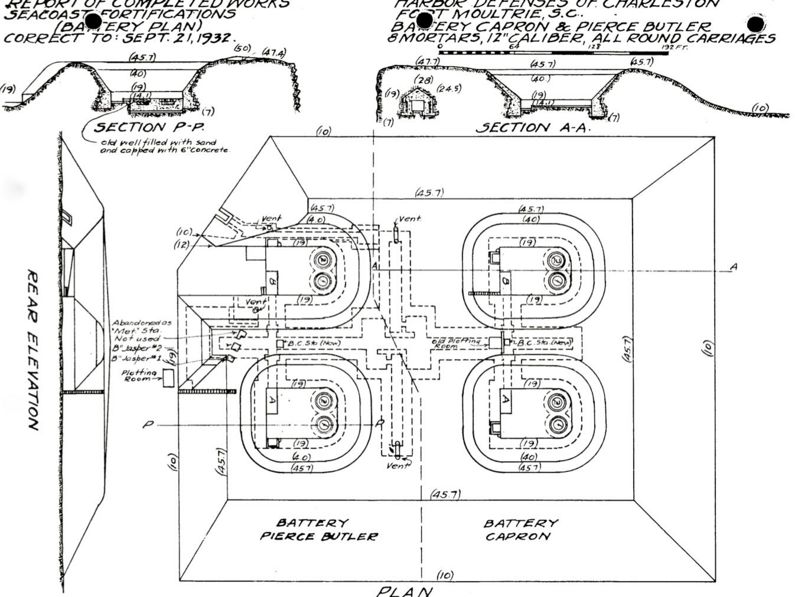Battery Butler
|
Battery Butler (1898-1942) - Battery Pierce Butler was a reinforced concrete, Endicott Period 12 inch coastal mortar battery on Fort Moultrie, South Carolina. The battery was originally named Fort Capron in G.O. 112, 6 Aug 1898 after Capt. Allyn K. Capron, 1st Regiment, U.S. Volunteer Cavalry (2nd Lt. 7th U.S. Cavalry, U.S. Army), who was killed at the battle of Las Guasimas, 24 Jun 1898, during the Spanish-American War. Renamed Battery Capron in G.O. 134, 1899. In 1906 the battery was administratively split into two batteries and the new battery was designated Battery Butler in G.O. 20, 25 Jan 1906, after Col. Pierce M. Butler, Palmetto Regiment, South Carolina Volunteers, who was killed in action at Churubusco, Mexico, 20 Aug 1847, during the Mexican-American War. Battery construction started in 1897, was completed in 1898 and transferred to the Coast Artillery for use 28 Jun 1898 at a cost of $ 92,678.76. Deactivated in 1942.

Endicott PeriodPart of the Harbor Defense of Charleston. Originally built as an Endicott Period concrete coastal mortar battery with sixteen 12" M1886 mortars mounted on M1891 mortar carriages. Originally the battery was divided into four mortar pits with four mortars in each pit. After a series of reconfigurations and mortar replacements Battery Butler ended up after World War I with two mortar pits with two M1890MI mortars in each pit, all mounted on M1896MI mortar carriages.
World War IThe U.S. entry into World War I resulted in a widespread removal of large caliber coastal defense gun tubes for service in Europe. Many of the gun and mortar tubes removed were sent to arsenals for modification and mounting on mobile carriages, both wheeled and railroad. Most of the removed gun tubes never made it to Europe and were either remounted or remained at the arsenals until needed elsewhere. None of the mortars at Battery Butler were involved in the World War I redistribution but all of the mortars and carriages were caught in the 1920 Disarmament Program and were ordered scrapped on 26 May 1920. Four newer mortars were shipped in to replace the eight that were salvaged and they were placed in the two front emplacements of each pit. The two rear emplacements in each pit were filled with sand and capped with 6" of concrete. The reduction of two mortars in each pit improved efficiency and reduced manpower requirements without significantly reducing the rate of fire.

World War IIAll four of the remaining mortars and carriages were ordered salvaged on 6 Dec 1942. Current StatusDestroyed.
Recent Blog Posts Sources: Links: Visited: 23 Jan 2010
| ||||||||||||||||||||||||||||||||||||||||||||||||||||||||||||||||||||||||||||||||||||||||||||||||||||||||||||||||||||||||||||||||||||||||||||||||||||||||||||||||||
- 12" Mortar M1886-1890MI
- 12" Mortar Battery
- 12" Mortar M1890MI
- Visited
- All
- South Carolina All
- South Carolina Battery
- South Carolina Charleston County
- Battery Butler
- Destroyed
- National Monument
- Endicott Period Battery
- Coastal Battery
- Fort Moultrie
- Harbor Defense of Charleston
- 2009 Southern Trip
- 1942 Scrapping
- 1920 Disarmament Program